
Don’t let the gay bashing that is the pivotal event of Diana Son’s Stop Kiss scare you away from its exciting Pasadena Playhouse debut. Under Seema Sueko’s nuanced direction and with a pair of star turns by Angela Lin and Sharon Leal, Son’s 1998 off-Broadway hit reveals itself at its heart to be the subtly shaded tale of two women who find themselves almost accidentally falling in love.
Sueko’s stark opening tableau of a shell-shocked Callie (Lin) does cue us in that there will be drama ahead, but we then cut quickly to Son’s wryly comedic first scene, the first of many that will chart the course of New York transplant Callie and recent Big Apple arrival Sara (Leal) on the road from meet-cute to friendship to something more.
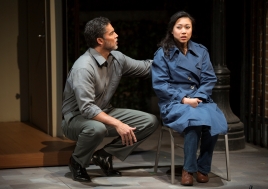 It doesn’t take long, however, before the first of Stop Kiss’s flash-forwards has Callie responding rather a tad too evasively to the questions posed by Detective Cole (Jeff de Serrano) about the attack that has left Sara fighting for her life.
It doesn’t take long, however, before the first of Stop Kiss’s flash-forwards has Callie responding rather a tad too evasively to the questions posed by Detective Cole (Jeff de Serrano) about the attack that has left Sara fighting for her life.
From then on, Stop Kiss alternates between Callie and Sara Before and Callie and Sara After, our foreknowledge of what lies ahead casting a shadow over what would, had the playwright opted for chronological order, have been a more conventionally light-and-frothy tale of friendship evolving into attraction … and an experimental first kiss that eventually proves too tempting to resist.
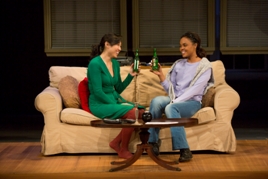 Callie and Sara couldn’t be more opposites-attract engaging from the moment that Sara (described by Callie as “some friend of an old friend who’s new to New York”) arrives on her New York doorstep, cat travel carrier in hand, Callie having agreed to keep the kitty while Sara looks for a place to live. Away from St. Louis for the first time, Sara could hardly be more excited about her new job teaching third grade at PS 32 in the Bronx, quite a change from the Quaker school where she taught back in Missouri.
Callie and Sara couldn’t be more opposites-attract engaging from the moment that Sara (described by Callie as “some friend of an old friend who’s new to New York”) arrives on her New York doorstep, cat travel carrier in hand, Callie having agreed to keep the kitty while Sara looks for a place to live. Away from St. Louis for the first time, Sara could hardly be more excited about her new job teaching third grade at PS 32 in the Bronx, quite a change from the Quaker school where she taught back in Missouri.
Playwright Son’s way with dialog is evident from the get-go, as when Sara asks about Callie’s job. “I ruin things for everyone else,” Callie replies. “You’re Rudy Giuliani?” wonders Sara. “No, I’m a 24-hour traffic reporter.”
As for Callie’s relationship status, well she used to live with her boyfriend until their breakup when “I got the apartment and he got my sister.”
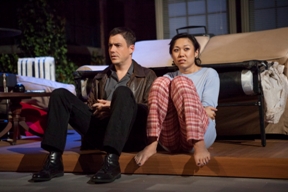 It’s not that Callie lacks male companionship, however. There’s always George (John Sloan), the longtime friend-with-benefits to whom she will “probably get married,” though you have to admit this is hardly the way to describe the man of a girl’s dreams.
It’s not that Callie lacks male companionship, however. There’s always George (John Sloan), the longtime friend-with-benefits to whom she will “probably get married,” though you have to admit this is hardly the way to describe the man of a girl’s dreams.
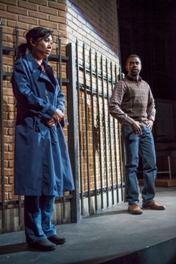 Sara, on the other hand, has arrived in New York freshly unattached, having broken up with Peter (Brandon Scott), her live-in boyfriend of seven years, before the move to The Big Apple.
Sara, on the other hand, has arrived in New York freshly unattached, having broken up with Peter (Brandon Scott), her live-in boyfriend of seven years, before the move to The Big Apple.
Meanwhile, back in the present, Detective Cole continues his investigation, aided by neighborhood eyewitness Mrs. Winsley (Amanda Carlin), whose revelation that Sara’s assailant had called the twosome “pussy-eating dykes” is our first indication that Callie and Sara’s friendship has led/will lead to something more.
Then again, when Callie blows off a just-arrived George for an evening out with Sara, we don’t need an outsider to cue us into the gal pals’ burgeoning attraction, one that neither could have imagined at their first meeting only weeks before.
From here on, Son’s script alternates between Callie’s apartment, Sara’s hospital room, and the ICU waiting room where Sara lies comatose as Detective Cole, George, Peter, and the audience get gradually closer to understanding how Callie and Sara’s relationship led to the attack-provoking kiss of the play’s cryptic title.
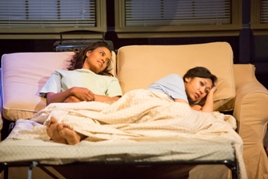 Despite its pre-cell phone, pre-social media New York setting, Stop Kiss remains every bit as potent and relevant in 2014 as it did before the societal changes of the past sixteen years. Gay bashings are perhaps even more common (or at least more commonly reported) than they were in the late ‘90s, and despite the more everyday visibility of LGBT Americans, there are still Callies and Saras in today’s world discovering to their surprise that they aren’t who they thought they were when that certain someone shows up at the door.
Despite its pre-cell phone, pre-social media New York setting, Stop Kiss remains every bit as potent and relevant in 2014 as it did before the societal changes of the past sixteen years. Gay bashings are perhaps even more common (or at least more commonly reported) than they were in the late ‘90s, and despite the more everyday visibility of LGBT Americans, there are still Callies and Saras in today’s world discovering to their surprise that they aren’t who they thought they were when that certain someone shows up at the door.
Stop Kiss’s arrival at the Pasadena Playhouse isn’t its first L.A. appearance, but it is, I believe, the first to fulfill its playwright’s two provisos—that “the cast should reflect the diversity of New York City” and that “it should be performed without interruption.”
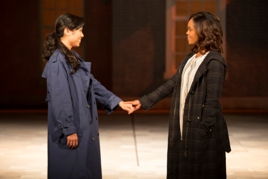 Though Son’s script itself gives us no indication of Callie and Sara’s race (or that of supporting players), Sueko’s casting of Asian-American Lin and African-American Leal is just what the playwright ordered and the kind of casting that ought to be happening as a matter of course in L.A. theater—but far too often isn’t. And the remaining characters’ ethnic mix of black, white, and Hispanic is equally rainbow-hued.
Though Son’s script itself gives us no indication of Callie and Sara’s race (or that of supporting players), Sueko’s casting of Asian-American Lin and African-American Leal is just what the playwright ordered and the kind of casting that ought to be happening as a matter of course in L.A. theater—but far too often isn’t. And the remaining characters’ ethnic mix of black, white, and Hispanic is equally rainbow-hued.
Son’s second stipulation is one that many theaters simply could not meet, her script requiring a grand total of twenty-two lickety-split scene changes. In other words, any thought of “without interruption” would be out of the question without the size and technical capabilities of a Pasadena Playhouse-scale stage.
Fortunately, David F. Weiner’s topnotch scenic design allows us to move in an instant from Callie’s apartment to the play’s many other locales, and hallelujah for that.
Still, even the briskest pacing would hardly matter without a cast to deliver the goods, and deliver them they do, beginning with the quirky charms of the absolutely irresistible Lin, who aces both the romcom breeziness of Callie’s pre-crisis scenes and the stark drama of life post-attack in a role that has her scarcely if ever leaving the stage and commanding it throughout the play’s intermissionless ninety minutes.
Leal too could not be more marvelous, her softer-shaded Sara proving every bit as appealing as Lin’s edgier Callie, and together the two leading ladies ignite romantic sparks usually reserved for Meg and Tom, or Justin and Mena, or Sandra and whoever.
Sloan, splendid as always, gives us so darned likeable a George that we can’t help but ache for him once Sara enters the picture, and the dynamic Scott makes so much of his two scenes, we can’t help wishing Son had given Peter a third.
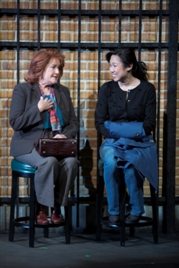 Karlin makes a strong impression in two very different roles, as Sara’s caring nurse and most notably as an eyewitness with her own marital cross to bear. de Serrano completes the cast terrifically as a no-nonsense police detective bent on discovering the truth.
Karlin makes a strong impression in two very different roles, as Sara’s caring nurse and most notably as an eyewitness with her own marital cross to bear. de Serrano completes the cast terrifically as a no-nonsense police detective bent on discovering the truth.
Stop Kiss looks and sound great on the Pasadena Playhouse stage thanks also to Dana Rebecca Woods’ fine costumes, Lap Chi Chu’s expert lighting, and Joe Huppert’s evocative sound design. Carol F. Doran’s wig design helps us distinguish between Karlin’s two roles.
Casting is by Deborah Aquila, CSA, Tricia Wood, CSA, and Lisa Zagoria, and once again the Pasadena Playhouse and artistic director Sheldon Epps are to be saluted for rewarding the talents of L.A.-based actors.
Hethyr “Red” Verheof is production stage manager and Jessica R. Aguilar is stage manager.
Joe Witt is general manager/production manager. Brad Enlow is technical director. Kristen Hammack is producing associate/company manager.
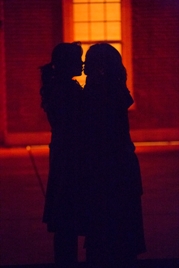 It’s hard to imagine a more eclectic pair of season openers than the Pasadena Playhouse’s recent reinvention of Cole Porter’s Kiss Me Kate and Diana Son’s Stop Kiss done right.
It’s hard to imagine a more eclectic pair of season openers than the Pasadena Playhouse’s recent reinvention of Cole Porter’s Kiss Me Kate and Diana Son’s Stop Kiss done right.
Prepare to be riveted from start to finish.
Pasadena Playhouse, 39 South El Molino Ave., Pasadena.
www.pasadenaplayhouse.org
–Steven Stanley
November 9, 2014
Photos: Jim Cox
Tags: Diana Son, Los Angeles Theater Review, Pasadena Playhouse



 Since 2007, Steven Stanley's StageSceneLA.com has spotlighted the best in Southern California theater via reviews, interviews, and its annual StageSceneLA Scenies.
Since 2007, Steven Stanley's StageSceneLA.com has spotlighted the best in Southern California theater via reviews, interviews, and its annual StageSceneLA Scenies.







 COPYRIGHT 2025 STEVEN STANLEY :: DESIGN BY
COPYRIGHT 2025 STEVEN STANLEY :: DESIGN BY